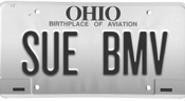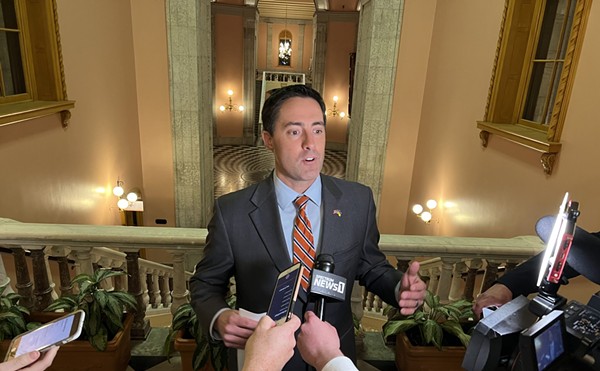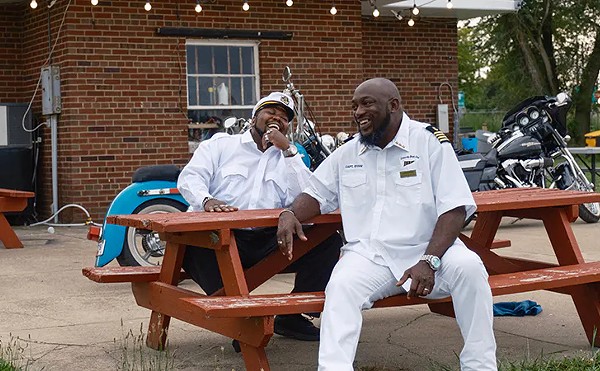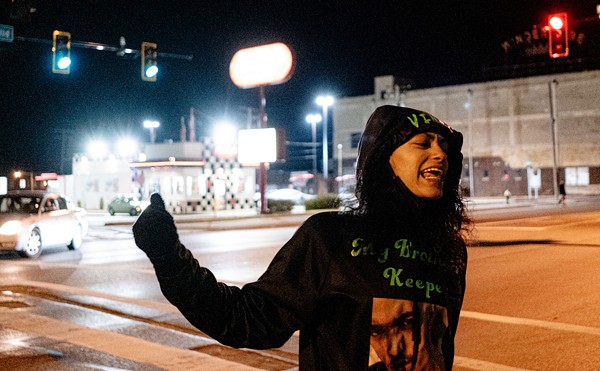The plate has proved somewhat of an albatross for the OSU senior. Police tend to hassle him for turning state property into game-day regalia. Little do they know the extent of his transgression. Phipps has two replicas of the plate affixed to his car and three others in a "Buckeye Room" he's constructing at home.
Though it would seem Phipps is quite satisfied with BUKIFN (Buckeye Fan), he would have preferred H8MICH -- a reference to his team's fierce rivalry with the University of Michigan. But after the Ohio Bureau of Motor Vehicles initially approved his request in 1999, it never provided him with the plates. He drove around with temporary tags for a month before finally stopping by the BMV office to see what was taking so long.
That's when he learned the bureau had put the brakes on his application. Since then, H8MICH has been joined on the vanity-plate scrap heap by NOOKIE1, UNDIES, and BOURBON, as well as multiple variations of HOT, GOD, and NASTY.
"They told me [the plate] promotes hatred and violence," says Phipps, a double major in business finance and real estate urban analysis. "It's a joke, and that's how I meant it."
In the past two years, his vanity-plate plight has drawn the attention of several newspapers and a volunteer attorney for the American Civil Liberties Union. When he heard of the case in the winter of 2000, Cleveland lawyer George Carr requested information about the BMV committee that reviews vanity-plate applications, as well as copies of all rejected applications since June 1, 1998. Two months later, the bureau sent him some information, including a list of vanity-plate requests from January through April.
There were 96 total requests. The state denied 82 of them.
According to BMV guidelines, the rejected applicant has no recourse. The bureau can refuse any request deemed "obscene" or "repugnant" because vanity plates are a representation of the state, not "a forum or an avenue for promoting distasteful or offensive messages or causes."
The BMV does not limit its objections to the literal. Abbreviations even loosely linked to drugs, crime, ethnicity, profanity, and social insensitivity are strictly prohibited. One could be BAD, NAKID, or SEXY. One could be a REDNECK, a PSYCHO, or a MOBSTER. One could even HATE, POOP, or KISS. But with few exceptions, one could not get these words printed on one's license plate last year.
Carr, now with the law firm Gallagher, Sharp, Fulton & Norman, believes the BMV is exercising discretionary powers it doesn't possess. After all, personalized plates are a designated public forum, he asserts.
"The U.S. Supreme Court says that if a government agency establishes a place where free speech activity is permitted, it can't engage in content or viewpoint discrimination. Once they allow people vanity plates, they're not allowed to discriminate, but they do."
He claims the BMV's policy is governed by "classic standardless, arbitrary discretion." And he plans to sue. Just as soon as he finds a plaintiff.
Carr has never had a plate rejected, so he has no personal grievance against the bureau. He feels certain, however, that some rejected applicants would challenge the BMV if they knew they had the ACLU on their side. Yet Carr can't find out who they are, because the state has refused to give him their applications.
So before Carr can challenge the policy, he first must prevail in an open-records action against the BMV. In a complaint filed last July, Carr said the rejected applications are public records, and the state must produce them in accordance with the open-records law.
BMV spokeswoman Julie Stebbins declined comment because of the pending litigation. But the state is resisting Carr's efforts. Its argument goes like this: Because the applications were rejected, they were never used to "perform a public function," an arcane but critical distinction within the Ohio Open Records Act. Besides, rejected applications are returned to motorists, according to Todd Boyer, a spokesman for the Ohio Attorney General's Office. "If the records don't exist, then there are no records to provide."
That's ridiculous, Carr says. The decision to grant or refuse plates is based on the applications, he argues, making them obvious public records. If the state has discarded them, Carr says he could sue for damages.
Franklin County Common Pleas Judge David Cain is expected to issue a decision soon on this game of legal cat-and-mouse. But even if Carr convinces the judge to release the records, he still has to convince someone to become his plaintiff.
Count him out, says Phipps.
He understands his case would make for a suitable challenge. H8MICH, after all, seems fairly benign, particularly in a state with widespread antipathy for those who live beyond its northern border. But he wouldn't want the state to lose the ability to screen plates.
"It would be different if I was just arguing about my case," says Phipps. "What I read about the ACLU is that they go out for everybody's rights. I don't know if I'd be interested in associating myself with that, because there are things I don't think children should see."
For his beloved Buckeyes, Phipps will wear his vanity plate like an albatross. But he's not about to become a poster boy for the benefit of NOOKIE1.












